Coconut oil is an amazing carrier oil that enables you to use essential oils on your skin and hair safely. It comes with many benefits on its own, like being antifungal and antibacterial.[1] Not to mention, it is super moisturizing for your skin! So, you can use coconut essential oil to dilute other oils for use in lotions, hair masks, or sore muscle rubs. The possibilities are truly endless when you have coconut oil on your side. Let’s learn how to dilute essential oils with coconut oil and some tips for doing so safely.
Why You Need To Dilute Essential Oils
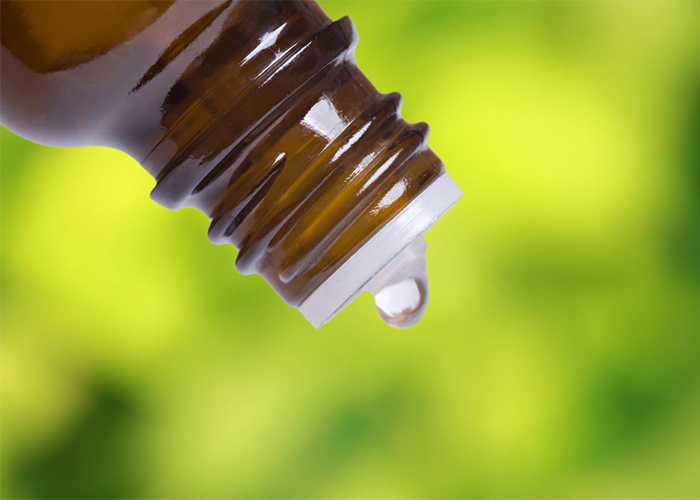
Why is learning how to dilute essential oils with coconut oil such a big deal anyway? Well, it is pretty simple actually. Essential oils are potent, plant-derived oils that sometimes require hundreds of pounds of the plant for one tiny bottle of oil. Naturally, this means the end-product is intensely strong and powerful. If you use certain essential oils directly on your skin, it can actually be irritating or unsafe. For example, clove essential oil is a strong skin irritant when used undiluted.[2]
However, when you use coconut oil (or any other carrier oil), you can increase the surface to which a small amount of oil can spread. This allows a smaller percentage of the oil to touch your skin per surface area. This way, you are getting all the amazing effects of the oil of your choice in a safe way. Plus, you can use less oil and save yourself some money.
How to Dilute Essential Oils With Coconut Oil in 4 Steps
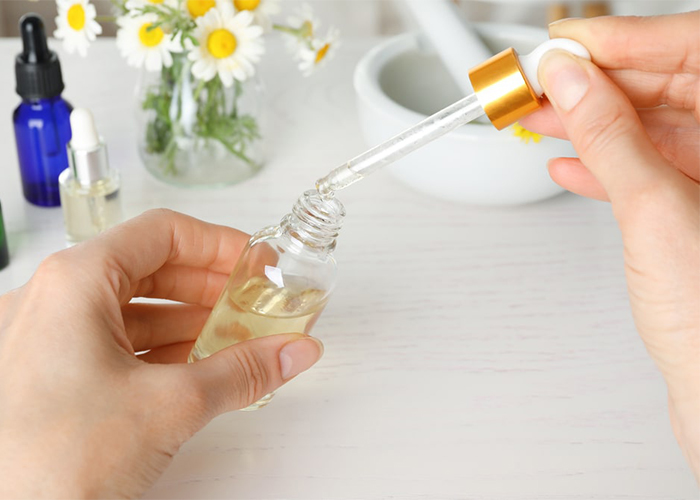
When mixing essential oils with coconut oil, it is important to use the right ratios for a safe and beneficial experience. To be safe, always start with a 1 percent dilution rate. To understand this, here is a base recipe on how to dilute essential oils with coconut oil for different age groups.
Prep Time: 5 mins | Serves: 30ml
Equipment: 30ml airtight bottle (preferably tinted glass), tablespoon measuring spoon, and small dropper tool
Ingredients
- 30ml fractionated coconut oil
- 6 drops maximum of your favorite essential oils
Instructions
- First, open your empty 30ml bottle.
- Next, drop in the fractionated coconut oil until almost full. 30ml is about the same as two tablespoons if you prefer to measure it this way. But take note, your spoons at home that you might use for eating cereal aren’t the same as a measuring tool tablespoon. So, if you are using a bottle that’s more than 30 ml but you want to ensure you have the right dilution, use a measuring tool.
- Choose which essential oils you want to put into this blend. Use the following to dilute properly per age group.
a. Adults (18+): 6 drops per 30ml of coconut oil
b. Children and toddlers: maximum 3 drops per 30ml of coconut oil[3]
c. Babies (always consult with a doctor first): ½ to 1 drop per 30ml of coconut oil - Put the airtight top on the bottle and shake up the mixture. Now, you’re ready to use your new blend topically. You can roll it onto your skin, combine it with some unscented lotion, or inhale straight from the bottle.
Tips and Safety Precautions
Now that you know the steps for how to dilute essential oils with coconut oil, let’s run through some tips and safety notes.
- Not all oils are equal
First, there are a few essential oils that require even more dilution if you want to be on the safe side. A few of these oils are cinnamon, lemongrass, clove, thyme, and oregano.[4] For these oils, use the same ratio as you would for a child or toddler, which is three drops per 30ml. - Check your diffuser
Next, remember that these dilutions are for topical use. If you are using your oils in a diffuser, follow the instructions on your essential oil diffuser model. - Be cautious around pets
Remember, some oils in high concentrations can be unhealthy and dangerous for your pets. Diffused tea tree is one oil to be aware of.[5]Also, some sources claim that all essential oils are dangerous for cats specifically, due to their sensitive metabolic systems.[6] Because there is a lack of research so far, it is best to limit diffusing essential oils around your pets or petting them after topical use. Check with your veterinarian for more information. - Consult your doctor when pregnant
Did you know that some essential oils are so powerful they can even mess with hormone levels? A few of these are sage, basil, and aniseed.[7] To be safe, always consult with your doctor before using essential oils during pregnancy to ensure the safety of your body and your baby.
3 Basic Coconut Oil and Essential Oil Mixes
To learn how to dilute essential oils with coconut oil was an easy task. Now, let’s put that knowledge to use with some coconut oil essential oil mixes you can use every day.
Invigorating Room Mist
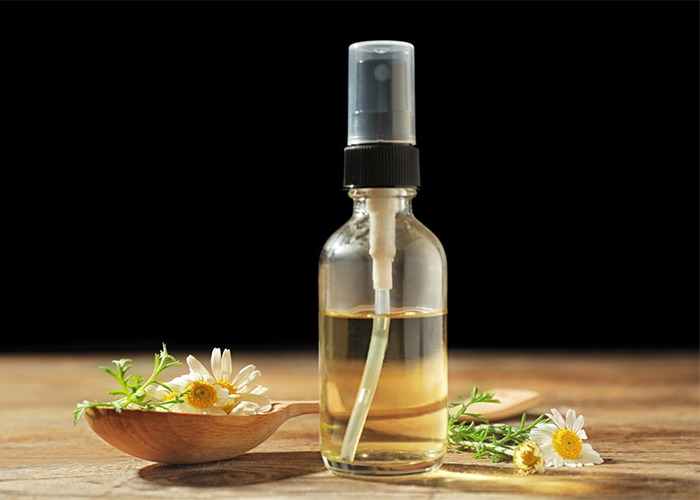
Equipment: Spray bottle
- ½ cup of water
- 30ml of fractionated coconut oil
- 3 drops of rosemary essential oil
- 3 drops of bergamot essential oil
For all the boss babes out there who need an office refresh now and again, try this coconut oil essential oil room mist blend. Rosemary essential oil can help you feel more alert and even increase your memory.[8] Also, the bergamot essential oil can help reduce anxiety caused by stress and help you boost your mood.[9] Plus, it smells so great you might even want to spritz a bit on yourself as well.
Roll-on perfume
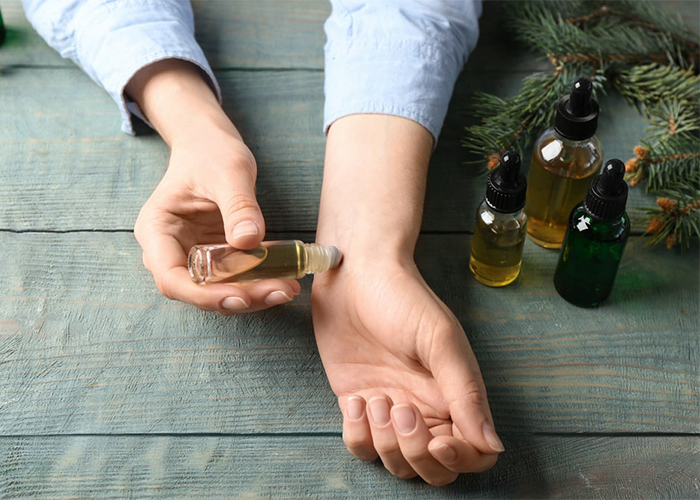
Equipment: 30ml glass roller bottle
- 30ml of fractionated coconut oil
- 3 drops of lavender essential oil
- 3 drops of pine essential oil
This perfume is a balance between sweet and calming, plus woodsy and sharp. It is not overwhelming (thanks to the coconut oil dilution) and can be smelt with just one little swipe on the wrist. The lavender aroma is flowery like a classic perfume might smell. Then, the pine comes in to create some dimension and open your nose to a deeper, fresh scent. This blend is sure to keep you on you smelling great all day long.
If you’ve mastered making this perfume, you should try your hand at making a simple essential oil cologne!
Moisturizing post-shave lotion
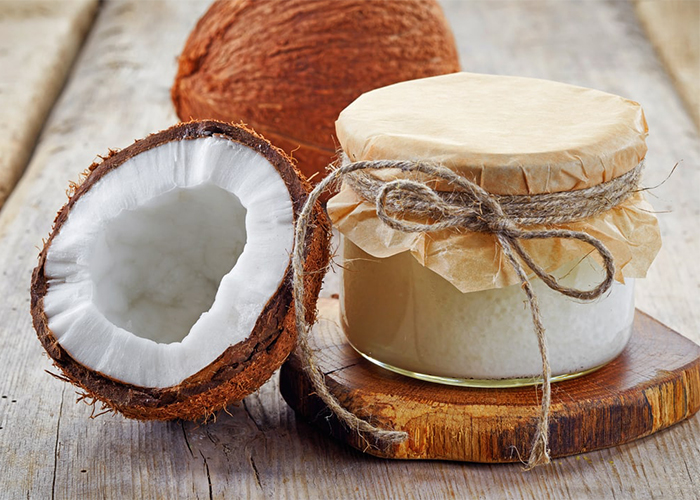
Equipment: Airtight storage container
- ½ cup of fractionated coconut oil
- ½ cup of shea butter
- 1 tsp (100 drops) of myrrh essential oil
After you shave your legs, there’s always the unavoidable scrape or ingrown hair that comes out to play. Luckily, myrrh essential oil is antibacterial and contains wound healing properties to speed up the healing process dramatically.[10] Also, the coconut oil and shea butter will hydrate your skin and make it soft and smooth. It is a winning blend for the summer months when your razor comes out from hiding since winter
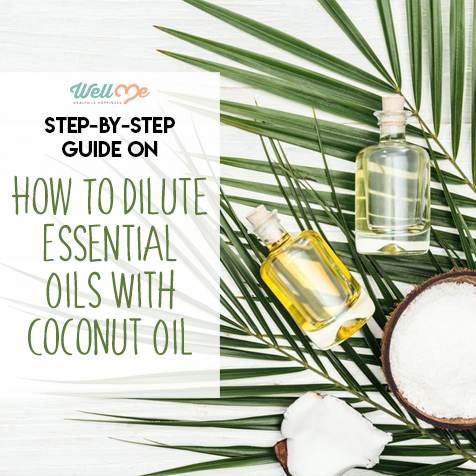
References
- [1] https://www.researchgate.net/profile/Gambhirsinh_Vala2/publication/280574942_Medicinal_Benefits_of_Coconut_Oil_A_Review_paper/links/55bb561b08ae092e965ed871/Medicinal-Benefits-of-Coconut-Oil-A-Review-paper.pdf
- [2] http://info.achs.edu/blog/aromatherapy-essential-oil-dangers-and-safety
- [3] https://naha.org/explore-aromatherapy/about-aromatherapy/methods-of-application
- [4] https://naha.org/explore-aromatherapy/safety#general
- [5] https://www.aspca.org/news/latest-home-trend-harmful-your-pets-what-you-need-know
- [6] https://naha.org/assets/uploads/Animal_Aromatherapy_Safety_NAHA.pdf
- [7] https://naha.org/explore-aromatherapy/safety#general
- [8] https://www.tandfonline.com/doi/abs/10.1080/00207450390161903
- [9] https://www.sciencedirect.com/science/article/pii/S0367326X10000171
- [10] https://patents.google.com/patent/US7666451B2/en
